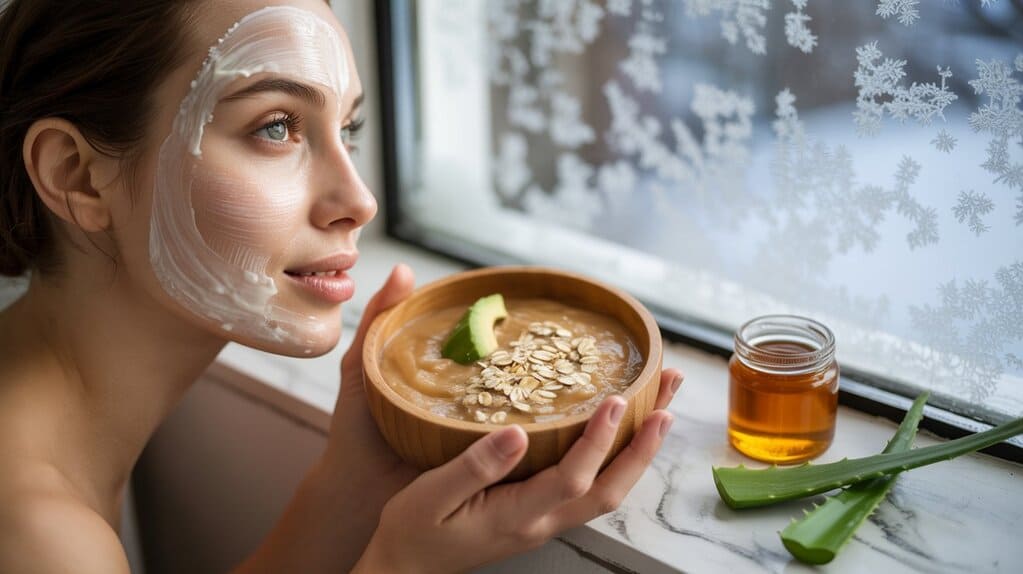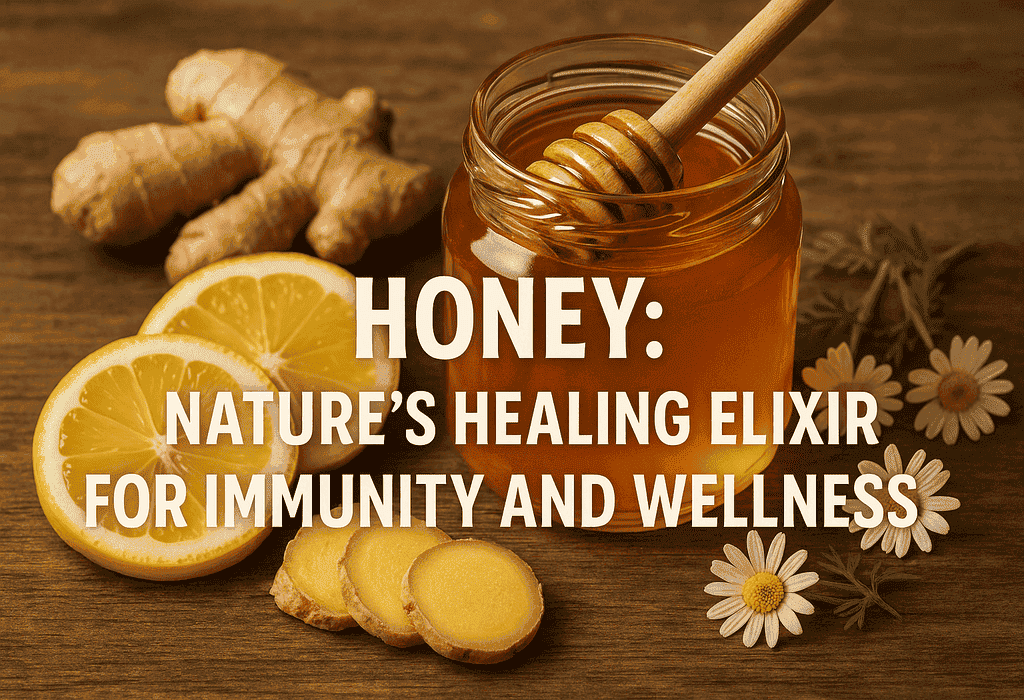
Introduction
Honey — often called a golden elixir — has nourished people and cultures for millennia. Beyond its role as a natural sweetener, raw honey contains a complex mixture of sugars, enzymes, antioxidants, vitamins, and bioactive compounds that explain its long history in food, medicine, and cosmetics. Modern clinical and laboratory studies continue to validate many traditional uses of honey, from wound care and antimicrobial action to gut health, skin repair, and sports nutrition. This article reviews the latest evidence, highlights practical uses, and provides SEO-friendly guidance so you can safely and effectively include honey in a healthy lifestyle. Wikipédia
Key points
- Honey is a natural source of energy (glucose + fructose) and micronutrients.
- Antimicrobial and wound-healing properties make certain medical-grade honeys clinically useful. PMC+1
- Prebiotic effects: honey can support beneficial gut bacteria and gut health. PMCMDPI
- Antioxidants in honey may help lower oxidative stress and support cardiovascular health. PMCMDPI
- Sports nutrition: honey is an effective, natural carbohydrate source for pre/post exercise fueling. PMC+1
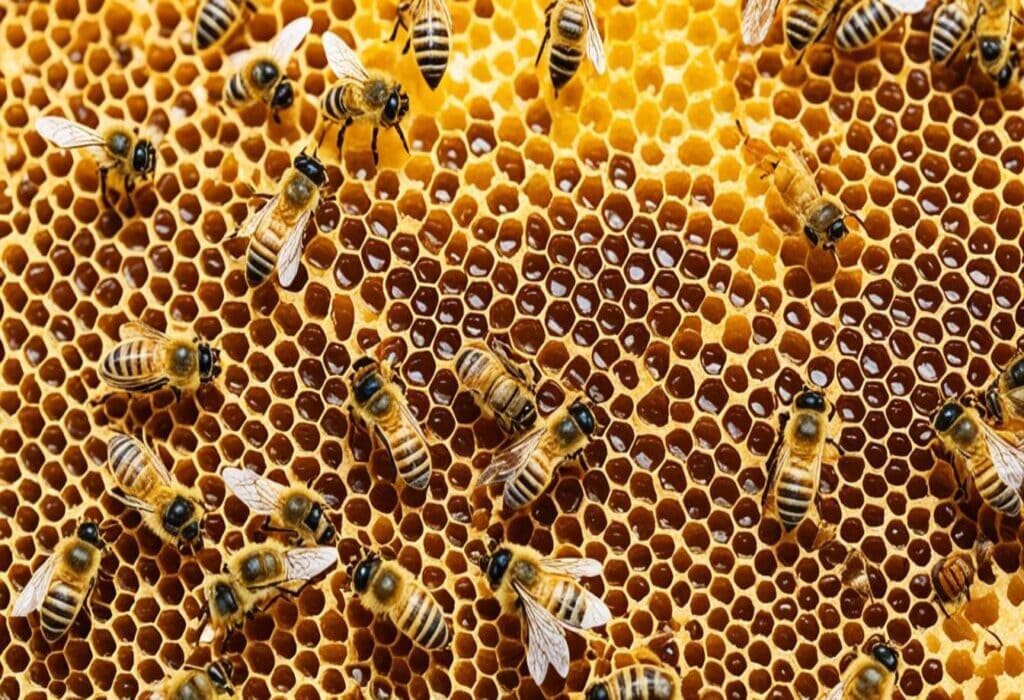
What is honey? (Short definition + composition)
Honey is a sweet, viscous food produced by bees from floral nectar or plant secretions. It is primarily composed of fructose and glucose, with smaller amounts of disaccharides, oligosaccharides, water, enzymes (e.g., glucose oxidase), organic acids, amino acids, vitamins, minerals, and polyphenolic antioxidants. Honey’s exact composition varies by floral source, geography, and processing. Wikipédia
Scientific evidence : What does research say?
1. Antimicrobial and wound-healing effects
Laboratory and clinical studies show that many honeys—especially medical-grade honeys such as Manuka (Leptospermum scoparium)—exhibit potent antibacterial activity. Mechanisms include high osmolarity, low pH, hydrogen peroxide production (from glucose oxidase), and unique non-peroxide factors (e.g., methylglyoxal in Manuka). Clinical reviews and randomized trials support topical honey for certain non-healing wounds, burns, and ulcers, and medical-grade honey products are used in wound dressings worldwide. PMC+2PMC+2
Why it matters (clinical takeaway) : For superficial wounds and some chronic ulcers, clinicians sometimes use licensed honey dressings because of broad-spectrum activity against resistant bacteria and promotion of granulation and re-epithelialization. PMC
2. Prebiotic and gut-health potential
Recent reviews and experimental work indicate that natural honey contains oligosaccharides and polyphenols that can act as prebiotics, supporting growth of beneficial bacteria (e.g., Bifidobacterium, Lactobacillus). Controlled studies and in vitro work suggest honey may help rebalance the microbiome, reduce gut inflammation, and improve digestive function—though more human RCTs are needed. PMCMDPI
Practical note : Use honey as part of a dietary approach to gut health (paired with fiber, fermented foods); it is not a replacement for medical therapy for major GI disease.
3. Antioxidant and cardiometabolic effects
Honey is rich in polyphenols and flavonoids—compounds known to reduce oxidative stress. Preclinical studies and human trials suggest modest improvements in markers of oxidative stress and some cardiometabolic parameters (lipids, blood pressure) with controlled honey intake. Animal studies of hypertensive models showed beneficial effects on oxidative stress and blood pressure; human studies are promising but heterogeneous. PMC+1
Important: Honey is still a source of added sugars; benefits are dose-dependent and must be balanced against caloric and glycemic effects.

4. Sports performance and recovery
Carbohydrate in honey is quickly available for working muscles and brain—making honey a practical natural fuel for training and endurance events. Systematic reviews and small trials show honey can support endurance performance, reduce post-exercise immune perturbation, and in some studies assist recovery and reduce muscle soreness when used as a pre- or post-exercise carbohydrate source. PMC+1
Honey for skin, hair, and beauty
Topical honey is widely used in cosmetic and dermatologic applications because of its humectant, antimicrobial, and anti-inflammatory properties. Honey is included in formulations for moisturizers, face masks, acne treatments, and hair-care products. Clinical reviews suggest benefits for wound care and minor burns; for aesthetic uses (anti-aging, brightening), evidence is largely laboratory-based or anecdotal but supported by honey’s antioxidant and moisturizing properties. PMC+1
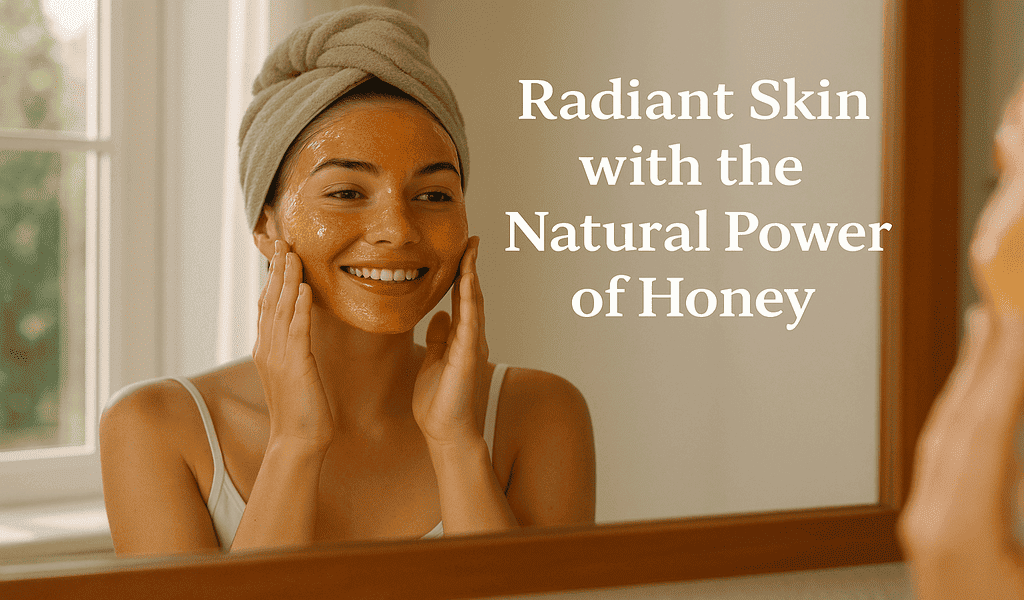
Types of honey and special properties
| Type | Region / Source | Notable properties |
|---|---|---|
| Manuka | New Zealand / Leptospermum | Unique non-peroxide antibacterial activity (methylglyoxal). Used in medical dressings. PMC |
| Sidr / Sidr (Lote) | Middle East, Asia | Traditional immune/digestive uses; high antioxidant potential in some batches. |
| Thyme / Herbal honeys | Mediterranean | Natural antiseptic and respiratory-supporting properties. |
| Clover / Wildflower | Global | Mild flavor, general-purpose culinary honey. |
Practical uses & dosing (evidence-based suggestions)
- Daily intake (moderation) : 1–2 teaspoons (≈7–14 g) daily can provide antioxidant benefits without excessive calories for most adults. Adjust downward for people watching blood sugar or total calories.
- Topical wound care : Use medical-grade honey dressings for selected wounds under clinical guidance; do not apply household honey on deep or infected wounds without consulting a clinician. PMCAVMA Journals
- Cough and sore throat : A spoonful of honey can soothe cough—some trials show effects comparable to dextromethorphan in children >1 year (do not give to infants <12 months).
- Sports fueling : 20–60 g carbs (honey included) per hour during endurance events is a practical target for many athletes; honey can substitute other liquid carbs when tolerated. PMC+1
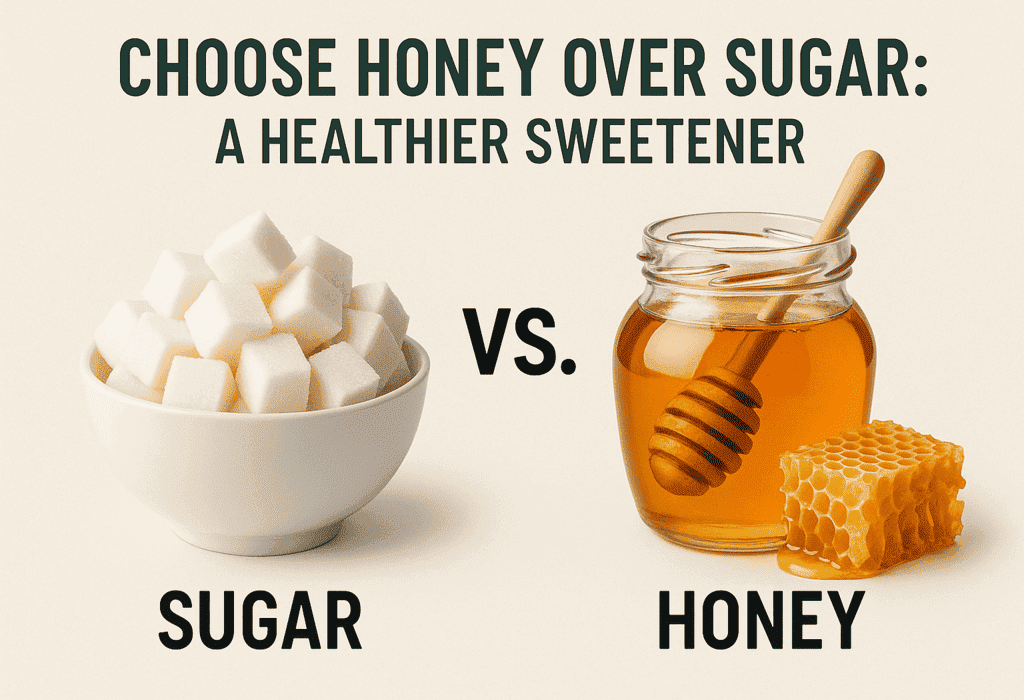
Safety and cautions
- Infants : Do not give honey to infants under 12 months due to risk of infant botulism.
- Diabetes and metabolic disease : Honey contains simple sugars and raises blood glucose; people with diabetes should consult their healthcare provider and monitor glycemic response.
- Allergic reactions : Rare; people with severe pollen or bee product allergies should be cautious.
- Adulteration : Buy raw, trustworthy sources or medical-grade brands—some commercial honeys are diluted or adulterated.
Recent notable studies & leading researchers (selected)
- Prebiotic potential : Schell KR et al., Frontiers in Nutrition (2022) — review of honey’s ability to support the gut microbiome. PMC
- Manuka in wound care : Kapoor N. et al., Journal / PMC review (2021) — Manuka honey as wound dressing material; multi-center reviews and clinical data. PMC
- Sports and recovery : Hills SP. et al., Systematic Review (2019) — honey and exercise immunology; Hemmati H. et al., DOMS study (2024) on honey beverage and muscle soreness. PMC+1
- Antimicrobial mechanisms : Mandal MD & Mandal S., PMC review (2011) and more recent meta-analyses summarizing honey’s activity against resistant pathogens. PMCScienceDirect
(These authors and reviews represent research teams and institutions across Asia, Europe, and North America who have contributed to modern honey science.)
Conclusion
Honey is more than a sweetener: it is a multifunctional natural product with demonstrated antimicrobial, prebiotic, antioxidant, and energy-provision properties. Clinical evidence supports specific medical uses—particularly medical-grade honey in wound care—while nutrition and sports studies highlight honey’s role as a natural carbohydrate fuel and immune-supportive food. For beauty and topical use, honey’s humectant and antimicrobial features make it a valuable ingredient in many formulations.
To gain benefits while minimizing risks, select raw or certified medical-grade honey from reputable sources, use honey in moderation, avoid giving it to infants under 1 year, and consult healthcare professionals for therapeutic uses (wounds, diabetes, or chronic disease). When used wisely, honey remains one of nature’s most versatile and evidence-supported treasures for health and beauty. PMC+1
References & selected sources
- Honey — Wikipedia. Wikipédia
- Mandal MD, Mandal S. “Honey: its medicinal property and antibacterial activity.” PMC / NCBI (Review). PMC
- Schell KR, et al. “The potential of honey as a prebiotic food to re-engineer gut health.” Frontiers in Nutrition (2022). PMC
- Kapoor N., et al. “Manuka honey: A promising wound dressing material” (review). PMC / NCBI (2021). PMC
- Hills SP., et al. “Honey supplementation and exercise: A systematic review.” PMC (2019). PMC
- Hemmati H., et al. “Effect of a honey-sweetened beverage on muscle soreness” (2024). PMC. PMC
- Stefanis C., et al. “Honey’s antioxidant and antimicrobial properties.” PMC (2023). PMC
- Erejuwa OO., et al. “Honey supplementation in hypertensive models” (animal study). PMC (2012). PMC
- Almasaudi S., et al. “The antibacterial activities of honey.” Food Science review (2021). ScienceDirect
- ClinicalTrials.gov — NCT02259491 Manuka honey for wound care (trial record). ClinicalTrials







